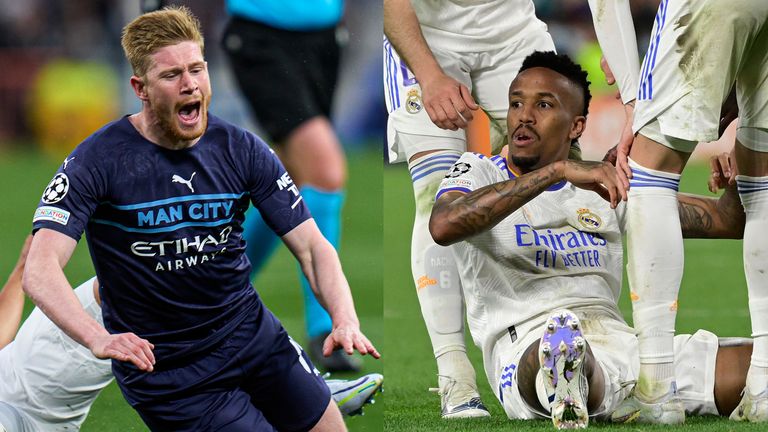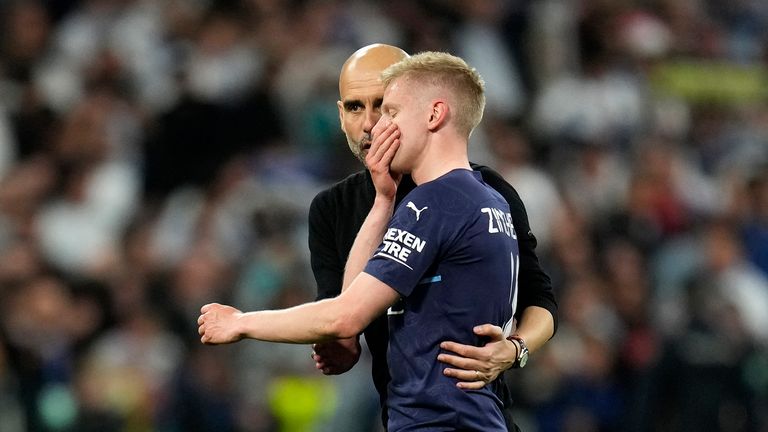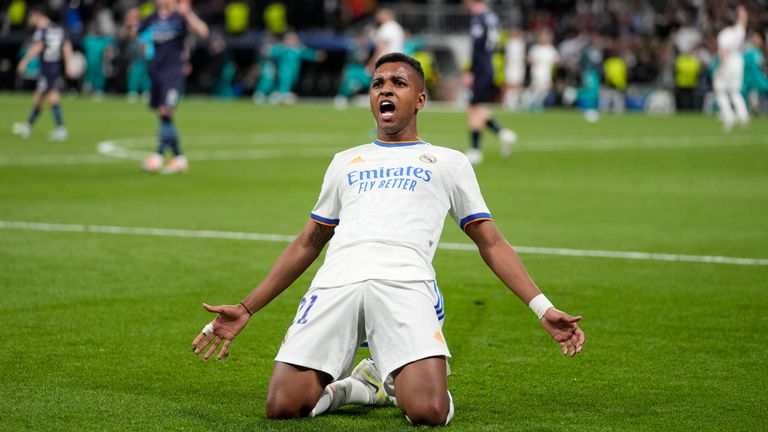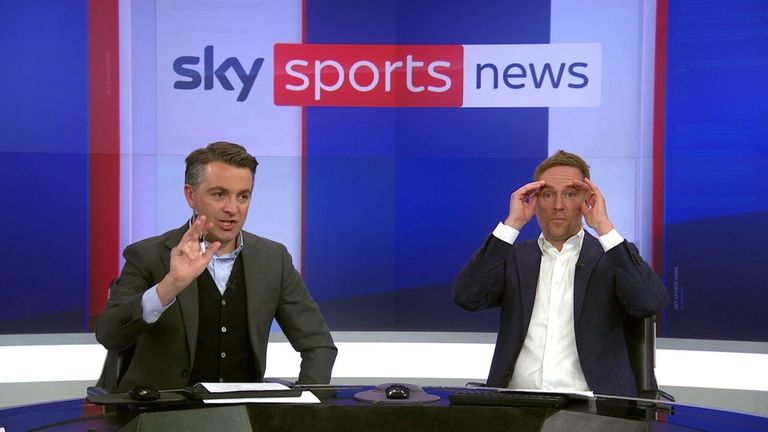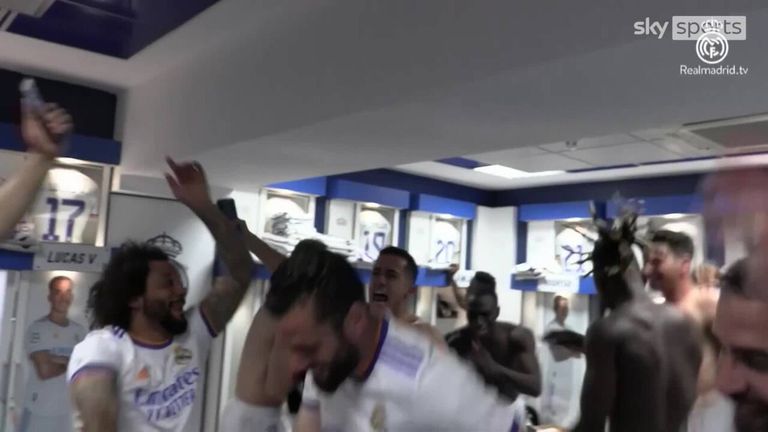Man City suffer Champions League heartache again: What went wrong for Pep Guardiola's side?
From long balls to the loss of Kevin De Bruyne and Kyle Walker, time not added on to the magic of Madrid, where did it go wrong for Manchester City?
Friday 6 May 2022 06:17, UK
Manchester City crashed out of the Champions League in heartbreaking fashion as Real Madrid produced an astonishing late comeback at the Bernabeu to book their place in the final against Liverpool.
City were leading 5-3 on aggregate heading into the final minute of the 90 but Rodrygo's quickfire double sent the game to extra-time before Karim Benzema's penalty completed the turnaround.
Why do Pep Guardiola's side continue to collapse at key moments on the European stage? Why did they start to go long in extra time? And did Kevin de Bruyne really go missing when it mattered?
Pep's collapse curse strikes again
Manchester City's defeat in Madrid was the latest in a long line of collapses from a Pep Guardiola side in the Champions League.
It was the sixth time the Spaniard has been eliminated at the semi-final stage of the competition, drawing him level with Jose Mourinho.
Astonishingly, of Guardiola's 11 Champions League exits, eight have seen alarming periods when his teams have conceded in quick succession.
In the semi-finals of the 2009/10 season, Guardiola's Barcelona let in two goals in 13 minutes against Mourinho's Inter Milan, who went on to win the trophy. As Bayern Munich boss in 2014, his team conceded three goals in 18 first-half minutes as they lost in the last four again, this time to Real Madrid. The following year, three goals in 17 minutes saw Bayern eliminated by Barcelona.
And the trend didn't stop when he made the move to Manchester. In 2017, two goals in eight minutes against Monaco saw City crash out at the last-16 stage. A year later, they were dumped out by Liverpool in the quarter-finals after conceding three goals in 19 minutes. In 2019, Tottenham scored two goals in three minutes to stun Guardiola's side, and in 2020 City were undone by Lyon in the last eight with two goals in eight minutes.
Surely, though, with back-to-back finals in sight, conceding three times in six minutes against Real Madrid on Wednesday night is the biggest collapse of all.
Guardiola has won this competition before, but you begin to wonder if he will ever win it again.
Why did City panic and go long?
Nothing illustrated Manchester City's desperation quite like the number of balls they sent skyward in the closing stages of the match. They contested nine aerial duels in the second period of extra-time - almost as many as the 10 in the previous hour and three quarters.
Ederson typified the shift in approach. This is a goalkeeper who has completed every single pass he has attempted in half a dozen Premier League games this season. He has a passing accuracy of 88 per cent. In Madrid, that dipped to 64 per cent. Late on, it was 50 per cent.
Long ball after long ball was pumped towards Real Madrid's box once behind in the tie and it was tempting to conclude that this is exactly what the Spanish side wanted. Their centre-backs coped with it but Manchester City's own game plan had been utterly abandoned.
The football that made them favourites was gone. This was not Guardiola's game. Their pass success dipped to 71 per cent in that second half of extra-time. Players were robbed six times in the final 20 minutes. That had not happened once in the opening 20 minutes.
There was utter panic and it was all so unlike Manchester City. Even when behind in the Premier League they would continue to pass the ball, trusting in their methods. Here, swept up in the occasion, crippled by the chaos, they became just another desperate team.
What happened to De Bruyne?
Kevin de Bruyne played a crucial role in City's first-leg victory at the Etihad Stadium, scoring the opening goal and setting up Gabriel Jesus for the second, but the Belgian was accused of failing to step up to the plate at the Bernabeu.
His evening ended prematurely as he was substituted for Ilkay Gundogan after just 72 minutes, his early withdrawal - at a pivotal point in the game - illustrating that he had failed to live up to his usual standards.
De Bruyne had the luxury of being rested for City's last game, the 4-0 win over Leeds at Elland Road, but he looked off the pace at times, his usual close control a little looser than we have come to expect.
Still, though, it would be unfair to pin City's failure to progress on him. He left the field early and City scored their opener soon afterwards, but the stats showed De Bruyne still contributed in an attacking sense.
In fact, despite his early withdrawal, he created more chances (three) than any other City player - including the delightful scooped pass to release Bernardo Silva for an early effort saved by Thibaut Courtois - and also ranked second for dribbles (three) and shots (two).
Perhaps he was not quite himself, but City had bigger problems elsewhere.
City run out of time
Daniele Orsato will not be popular with the blue side of Manchester for some time. The referee led an all-Italian team of officials on a difficult night in the Bernabeu which he appeared to want over as soon as possible.
The City bench had already been enraged when only three minutes of added time was signalled at the end of extra-time - six minutes were added at the end of the 90 - after Real had consistently attempted to break up play.
The hosts did their best to run the clock down as centre-back Eder Militao twice received treatment from the physios during the second half of extra-time before eventually being subbed in the 115th minute.
Thibaut Courtois also did his best to delay any City attacks by taking his time over restarts as did the other Real players when the ball went out of play. None of them were booked for timewasting.
But to compound matters, Orsato whistled for full-time 10 seconds early with the ball at the feet of City goalkeeper Ederson as he was about to launch it back up field for one final attack.
Comeback kings Real strike again
Real Madrid have trailed at some point in each of the knockout rounds during this season's Champions League. They have become the first side, since 2003-04 when the Last 16 was introduced, to lose a match in the last 16 (0-1 vs PSG), quarter-final (2-3 vs Chelsea) and semi-final (3-4 vs Man City) in a campaign and still reach the final.
After losing in Paris, Real were then 2-0 down on aggregate at half-time in the second leg before Karim Benzema struck a memorable second half hat-trick to send Mauricio Pochettino's crashing out.
Benzema hit another treble in a 3-1 first-leg victory at Chelsea to put them in control of the tie yet the Blues turned it round at the Bernabeu, taking a 3-0 lead to move 4-3 ahead on aggregate. However, Rodrygo pulled one back with 10 minutes left to force extra time before Benzema netted to give Real an incredible 5-4 aggregate victory.
Yet Real were still able to take their epic Champions League journey to new heights in the semi-finals. They trailed Manchester City after 94 seconds in the first leg all the way until the 91st minute of the second tie.
City won 4-3 at the Etihad and were then leading 5-3 on aggregate heading into added time before Rodrygo unbelievably scored twice in two minutes for 5-5 and extra time. Then Benzema kept his cool from the penalty spot to complete yet another unthinkable Real comeback.
Walker injury made things more difficult
It was apparent from the outset that Real Madrid's main offensive weapon - at least until Rodrygo appeared off the bench to turn the tie - would be Vinicius Junior rather than Karim Benzema. But Kyle Walker had the pace and the nous to cope with that threat.
Time and again, he was up to the challenge in the opening 45 minutes. But as the game progressed and Walker's questionable fitness became more of an issue, it became clear that the England full-back would be unable to see out the evening. Could City adapt?
Oleksandr Zinchenko came on after 72 minutes with Joao Cancelo switching sides. The first goal came after Benzema pulled away from the Portuguese at the far post and hooked the ball back into the path of Rodrygo to score. City lost control after that.
